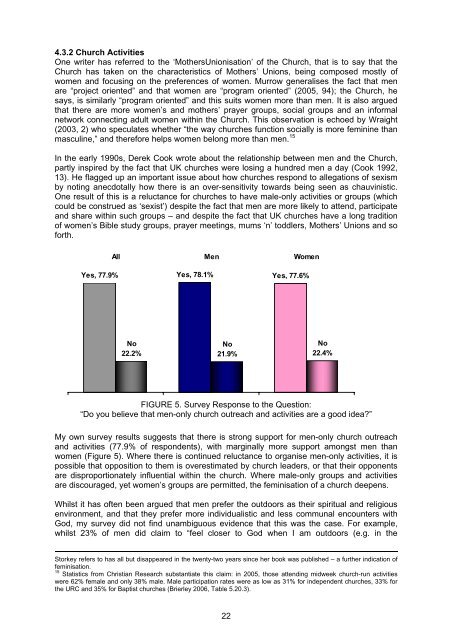Disbanded Brothers – Has a ‘Feminised’ Church Alienated Men in the UK?
Disbanded Brothers - Has a 'Feminised' Church ... - Theduckers.org
Disbanded Brothers - Has a 'Feminised' Church ... - Theduckers.org
- No tags were found...
Create successful ePaper yourself
Turn your PDF publications into a flip-book with our unique Google optimized e-Paper software.
4.3.2 <strong>Church</strong> Activities<br />
One writer has referred to <strong>the</strong> ‘Mo<strong>the</strong>rsUnionisation’ of <strong>the</strong> <strong>Church</strong>, that is to say that <strong>the</strong><br />
<strong>Church</strong> has taken on <strong>the</strong> characteristics of Mo<strong>the</strong>rs’ Unions, be<strong>in</strong>g composed mostly of<br />
women and focus<strong>in</strong>g on <strong>the</strong> preferences of women. Murrow generalises <strong>the</strong> fact that men<br />
are “project oriented” and that women are “program oriented” (2005, 94); <strong>the</strong> <strong>Church</strong>, he<br />
says, is similarly “program oriented” and this suits women more than men. It is also argued<br />
that <strong>the</strong>re are more women’s and mo<strong>the</strong>rs’ prayer groups, social groups and an <strong>in</strong>formal<br />
network connect<strong>in</strong>g adult women with<strong>in</strong> <strong>the</strong> <strong>Church</strong>. This observation is echoed by Wraight<br />
(2003, 2) who speculates whe<strong>the</strong>r “<strong>the</strong> way churches function socially is more fem<strong>in</strong><strong>in</strong>e than<br />
mascul<strong>in</strong>e,” and <strong>the</strong>refore helps women belong more than men. 15<br />
In <strong>the</strong> early 1990s, Derek Cook wrote about <strong>the</strong> relationship between men and <strong>the</strong> <strong>Church</strong>,<br />
partly <strong>in</strong>spired by <strong>the</strong> fact that <strong>UK</strong> churches were los<strong>in</strong>g a hundred men a day (Cook 1992,<br />
13). He flagged up an important issue about how churches respond to allegations of sexism<br />
by not<strong>in</strong>g anecdotally how <strong>the</strong>re is an over-sensitivity towards be<strong>in</strong>g seen as chauv<strong>in</strong>istic.<br />
One result of this is a reluctance for churches to have male-only activities or groups (which<br />
could be construed as ‘sexist’) despite <strong>the</strong> fact that men are more likely to attend, participate<br />
and share with<strong>in</strong> such groups <strong>–</strong> and despite <strong>the</strong> fact that <strong>UK</strong> churches have a long tradition<br />
of women’s Bible study groups, prayer meet<strong>in</strong>gs, mums ‘n’ toddlers, Mo<strong>the</strong>rs’ Unions and so<br />
forth.<br />
All <strong>Men</strong> Women<br />
Yes, 77.9% Yes, 78.1% Yes, 77.6%<br />
No<br />
22.2%<br />
No<br />
21.9%<br />
No<br />
22.4%<br />
FIGURE 5. Survey Response to <strong>the</strong> Question:<br />
“Do you believe that men-only church outreach and activities are a good idea?”<br />
My own survey results suggests that <strong>the</strong>re is strong support for men-only church outreach<br />
and activities (77.9% of respondents), with marg<strong>in</strong>ally more support amongst men than<br />
women (Figure 5). Where <strong>the</strong>re is cont<strong>in</strong>ued reluctance to organise men-only activities, it is<br />
possible that opposition to <strong>the</strong>m is overestimated by church leaders, or that <strong>the</strong>ir opponents<br />
are disproportionately <strong>in</strong>fluential with<strong>in</strong> <strong>the</strong> church. Where male-only groups and activities<br />
are discouraged, yet women’s groups are permitted, <strong>the</strong> fem<strong>in</strong>isation of a church deepens.<br />
Whilst it has often been argued that men prefer <strong>the</strong> outdoors as <strong>the</strong>ir spiritual and religious<br />
environment, and that <strong>the</strong>y prefer more <strong>in</strong>dividualistic and less communal encounters with<br />
God, my survey did not f<strong>in</strong>d unambiguous evidence that this was <strong>the</strong> case. For example,<br />
whilst 23% of men did claim to “feel closer to God when I am outdoors (e.g. <strong>in</strong> <strong>the</strong><br />
Storkey refers to has all but disappeared <strong>in</strong> <strong>the</strong> twenty-two years s<strong>in</strong>ce her book was published <strong>–</strong> a fur<strong>the</strong>r <strong>in</strong>dication of<br />
fem<strong>in</strong>isation.<br />
15 Statistics from Christian Research substantiate this claim: <strong>in</strong> 2005, those attend<strong>in</strong>g midweek church-run activities<br />
were 62% female and only 38% male. Male participation rates were as low as 31% for <strong>in</strong>dependent churches, 33% for<br />
<strong>the</strong> URC and 35% for Baptist churches (Brierley 2006, Table 5.20.3).<br />
22






